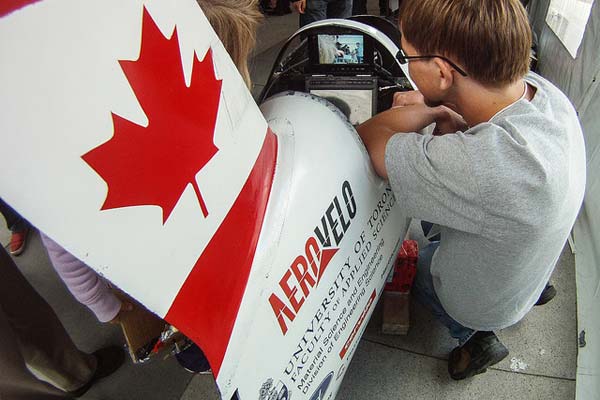
DIY robots, 3D printed chocolate and more: calling U of T entrepreneurs, students to join Toronto Maker Faire
Published: September 15, 2014
For anyone who makes anything – from R2D2s to DIY skateboards to 3D-printed chocolate sculptures and beyond – taking part in the Maker Faire means entering into a worldwide family-friendly carnival of wondrous, inventive physical stuff.
Launched as a showcase of cool inventions from California’s Bay area in 2006, satellite Maker Faires have since popped up around the globe in locations like Nairobi, Oslo and Rome, with a second annual instalment hosting thousands of ‘makers’ in Toronto on November 22 and 23.
“We are looking forward to getting feedback from the community as well as seeing what's out there from other local startups and makers,” said Michael Helander, co-founder of OTI Lumionics, a startup founded on University of Toronto research innovations in organic LED lighting. “We strongly believe in the importance of building the local startup community and so we are delighted to be attending the Maker Faire in Toronto.” (Read more about OTI Lumionics)
Maker Faire debuted in Toronto last fall, gathering 4,000 makers of all ages and experience levels as they shared and experimented with a wild range of projects. Now, the Toronto team is raising the stakes, as they are set to present more than 100 exhibits – including the OTI Lumionics demo for their aerelight lamps - as well as a range of workshops and events in the Toronto Reference Library. (Read more about the Toronto Mini Maker Faire)
“Maker Faire is a unique opportunity to showcase inventions, meet fellow tinkerers, and see the diverse maker crowd response to projects,” said Elena Yunusov, a co-organizer of Toronto Maker Faire and a digital communications strategist at U of T’s Faculty of Medicine.
“It's important to give students an opportunity to play with technology, realize that everyone can make things, and see that tinkering is a vital aspect of innovation and learning.”
Last year’s Faire drew U of T startups and students as attendees and exhibitors. Now, the call is for more university makers and audiences to join for the 2014 edition: the Toronto Maker Faire is accepting exhibitor applications until September 21, and offers free tickets for attendees online.
Yunusov offers three top reasons U of T makers should submit their ideas for showcase, discussion and play at Toronto Maker Faire 2014:
1. Put your early-stage project into the hands of real users of all ages
"Last year, Battlegrounds put on an advanced laser tag game. After two years of design and testing, this was their first public demonstration, and hundreds of kids got to play it. When a couple of their 3D printed laser tag guns broke, the kids using them were upset they had broken something. The makers, on the other hand, were super happy because they finally knew what they needed to fix to make the equipment more durable. It was awesome, because the kids were super surprised the makers were giving them bear hugs and gifts for breaking things!"
2. Experience ideas of the future with your own eyes – and hands
"The Maker Faire is a great way to get inspired by all the amazing inventions that exist and to see it all first-hand – get a glimpse of the kind of future that is unevenly distributed."
3. Build a business grounded in imagination
"The Maker Faire attracts entrepreneurs because they can showcase and prototype their inventions, develop new ideas, gauge public reaction and chat with other entrepreneurs. Many of the projects are crowdfunded, which is amazing to see."
Brianna Goldberg writes about startups and entrepreneurship for U of T News; read more about entrepreneurs at U of T.



